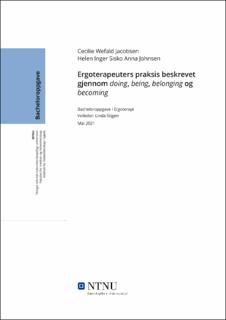| dc.contributor.advisor | Stigen, Linda | |
| dc.contributor.author | Jacobsen, Cecilie Wefald | |
| dc.contributor.author | Johnsen, Helen Inger Sisko Anna | |
| dc.date.accessioned | 2021-09-24T19:51:01Z | |
| dc.date.available | 2021-09-24T19:51:01Z | |
| dc.date.issued | 2021 | |
| dc.identifier | no.ntnu:inspera:77256814:80904067 | |
| dc.identifier.uri | https://hdl.handle.net/11250/2782346 | |
| dc.description.abstract | Innledning: Denne studien fokuserer på norske ergoterapeuters praksis, og deres opplevelser og erfaringer knyttet til arbeidshverdagen. På bakgrunn av tidligere forskning sees det et behov for å undersøke norske ergoterapeuters arbeidshverdag. Studien er en del av et større forskningsprosjekt som dreier seg om ergoterapi i et internasjonalt perspektiv.
Hensikt: Hensikten med denne studien var å samle erfaringer rundt ergoterapeuters praksis i Norge, med fokus på hvordan deres aktiviteter og handlinger formes av konteksten de befinner seg i, og hvordan det påvirker deres opplevelse av arbeidshverdagen. Forskningsspørsmålet var: «Hvordan påvirkes ergoterapeuters arbeidshverdag av organisering, ansvar og forventninger?».
Metode: Studien har benyttet kvalitativ design. Det ble gjennomført fire individuelle semistrukturerte intervju av ergoterapeuter i kommunehelsetjenesten og spesialisthelsetjenesten.
Resultat: Hovedfunnene ble inndelt i tre overordnede tema: betydningen av aktivitet for mennesket, omgivelsenes påvirkning på ergoterapeutenes praksis og ergoterapeutenes ansvar og arbeidsoppgaver. Informantene vektla viktigheten av å benytte sin kjernekompetanse og spesielt aktivitetsperspektivet i arbeidet. Det kom frem at kunnskapen om ergoterapi er varierende, informantene brukte derfor tid på å forklare sin rolle i møte med brukere og andre. Arbeidsplassens rammer påvirket i stor grad ergoterapeutenes arbeidshverdag Informantene vektla viktigheten av å være tydelig i sin rolle i det tverrfaglige teamet. Dette førte til at ergoterapeuten får brukt mer av sin spesialkompetanse. Informantene beskrev et stort fokus på aktivitet i kartlegging og intervensjon med utgangspunkt i brukerens mål og meningsfulle aktiviteter.
Konklusjon: Ergoterapeutenes arbeidshverdag ble kjennetegnet av fokuset på mennesket i samhandling med sine omgivelser med aktivitet i fokus. Arbeidsoppgavene var påvirket av omgivelsene gjennom krav stilt av ledelsen og andre faggrupper, noe som kunne føre til tidspress. Evnen til å formidle tydelig hvilken kompetanse ergoterapeutene innehar påvirket det tverrfaglige samarbeidet og mulighetene til å benytte sin fagkompetanse. | |
| dc.description.abstract | Background: This study focuses on Norwegian occupational therapists experiences related to their practice. Previous research outlines that further research is necessary related to this subject. The study is a part of a research project that explores occupational therapy in an international perspective.
Purpose: The aim of this study was to explore/collect experiences about occupational therapists practice in Norway. The focus was how their environment influenced their actions and activities and how this affected their experience of their daily practice. The research question was: “how does organization, responsibility and expectations influence occupational therapists daily practice?”
Method: The study used a qualitative approach. Data were collected by four individual semi-structured interviews of occupational therapists who worked in community health services and specialist health services.
Results: The main findings in the study were divided into three themes: the importance of activity, how the environment influences the occupational therapists daily practice and the occupational therapists tasks and responsibility at the workplace. The participants emphasized the importance of using their core competence, especially the activity perspective in their work. Findings showed that there is varying knowledge of occupational therapy, and the participants often had to explain their role to clients and other people they meet. Their practice was influenced by the framework of the workplace. The importance of being clear about their role in interdisciplinary collaboration was emphasized, which would give the occupational therapist the possibility to use more of their core competence. They described that activity was a big part of both assessment and intervention, and that their focus was the clients' goals and meaningful activities.
Conclusion: The occupational therapists daily practice was characterized by the perspective of activity and human in interaction with its environment. The tasks were influenced by the environments through expectations from the management and other professions at the workplace, which might lead to time pressure. The ability to clearly communicate the occupational therapy competence influenced the interdisciplinary cooperation and the possibilities to use their professional expertise. | |
| dc.language | nob | |
| dc.publisher | NTNU | |
| dc.title | Ergoterapeuters praksis beskrevet gjennom doing, being, belonging og becoming | |
| dc.type | Bachelor thesis | |
